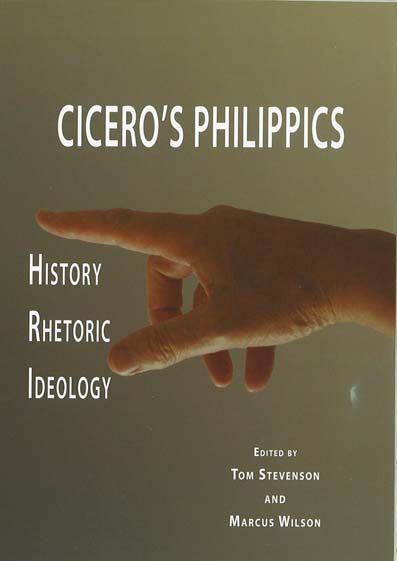
Tom Stevenson, Marcus Wilson (dir.), Cicero's Philippics: History, Rhetoric and Ideology, Auckland, N.Z.: Polygraphia, coll. "Prudentia" 37-38, 2008. Pp. x, 374.
- ISBN 9781877332562.
- NZ $80.00 (pb).
Recension par John Henderson (King's College, Cambridge) dans Bryn Mawr Classical Review 2010.03.16.
Présentation de l'éditeur:
After the assassination of Julius Caesar in 44BC, Mark Antony tookcontrol of Rome. Before the end of the year Cicero had taken on theleadership of the opposition in the Senate to Antony and his policies.The speeches made by Cicero against Antony, later published under thetitle Philippics, mounted a sustained attack on the way Antony exercised and abused his position of power.
As historical sources the Philippicswere often neglected and disparaged during the 20th century, but theyhave recently attracted renewed scholarly interest for their politicalsignificance and as models of Roman and especially senatorial oratory.
Thetime when the speeches were delivered coincided with the early publiccareer of the future emperor Augustus. Many of the ideas and much ofthe political vocabulary of the Philippics continued to resonate in the cultural life and imperial ideology of the Augustan principate.
Thisvolume collects papers by a series of specialists in the field ofCiceronian studies who have set out to reconsider the historical impactof the Philippic speeches and their later significance in Roman culture.
Delivered at a crucial point in the painful political transition from the Roman Republic to the imperial system, the Philippicsare the final speeches of Rome's greatest orator at the peak of hispowers. He paid the price for the political stance he took in thespeeches with his life.
Table des matières:
1 Tom Stevenson and Marcus Wilson, Cicero's Philippics: History, Rhetoric and Ideology, 1-21
2 Douglas Kelly, Publishing the Philippics, 44-43 BC, 22-38
3 Gesine Manuwald, Cicero Versus Antonius: On the Structure and Construction of the Philippic Collection, 39-61
4 Richard Evans, Phantoms in the Philippics: Catiline, Clodius and Antonian Parallels, 62-81
5 Martin Drum, Cicero's Tenth and Eleventh Philippics: The Republican Advance in the East, 82-94
6 Tom Stevenson, Tyrants, Kings and Fathers in the Philippics, 95-113
7 Natalie Angel, Clementia and Beneficium in the Second Philippic, 114-30
8 Roger A. Pitcher, The Second Philippic as a Source of Aristocratic Values, 131-39
9 Eleanor Cowan, Libertas in the Philippics, 140-52
10 Emily Christian, A Philosophy of Legitimacy in Cicero's Philippics, 153-67
11 Julian Larsen, Cicero, Antony and the Senatus Consultum Ultimum in the Second Philippic, 168-80
12 Kathryn Welch, Nimium felix: Caesar's Felicitas and Cicero's Philippics, 181-213
13 A.M. Stone, Greek Ethics and Roman Statesmen: De Officiis and the Philippics, 214-39
14 Anthony Corbeill, O Singulare Prodigium: Ciceronian Invective as a Religious Expiation, 240-54
15 Catherine Steel, Finessing Failure: the Sixth Philippic, 255-65
16 Tia Dawes, The Encomium of Brutus in Philippic Ten, 266-81
17 Jon Hall, The Rhetorical Design and the Success of the Twelfth Philippic, 282-304
18 Marcus Wilson, Your Writings or Your Life: Cicero's Philippics and Declamation, 305-34